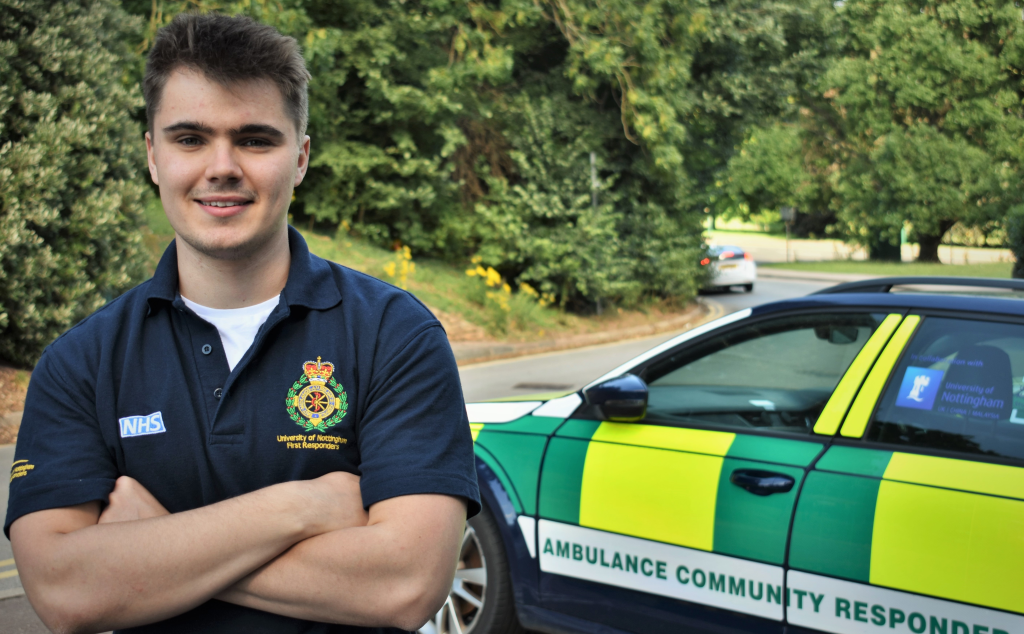November 16, 2020, by School of Medicine
50 at 50: Students responding to 999 calls in Nottingham
 By your side
By your side
I’ve dressed your bloody wounds
Held your hands and kept you warm
When we stepped in the prognosis looked poor
Medicine is complicated but CPR is simple and that time you got a second chance
We help triple immobilise, sometimes medicate, always dedicate ourselves to our patients
Patience is our virtue, but we know when urgency is of the essence
You may be in mental health crisis or hypotensive crisis
But it was a family crisis when your boy passed in your arms which stays with me
You respond with humanity and gratitude, at times you’re impatient or even abuse us
Socrates often can’t get to the bottom of it and 15 litres isn’t always enough
But these are our tools – the simple things often make the biggest difference
We make mistakes but make no mistake that we do our best for you
My colleagues, my friends, help both of us through it
To you, to them, to us – we are by your side
Who we are
UoN First Responders are a group of healthcare students who dedicate their spare time to support East Midlands Ambulance Service on the 999 front line. We were founded by students in 2014, and continue to be led and fuelled by students eager for more experience.
Throughout term time, we often have one or both of our response vehicles (CFR17 and CFR18) double crewed and on standby for jobs anywhere throughout Nottingham. You can find us parked up on Portland Hill when we’re not on duty. In January of this year, our incredible team did 220 jobs and volunteered for over 700 hours – a record number enough to cover Nottingham 24/7 for the entire month.
What we do

All time statistics for UoN First Responders as of July 2019 including over 17,000 hours and over 6,000 jobs
We might be on call at home with a coffee at 3 pm or parked up in the streets of the city at 1 am when we are allocated to a job. We immediately mobilise towards the address and start working through a well–drilled series of thoughts ‘How long do we have to prepare? How are we going to approach this job? Who will lead the case when we are on scene?’ Although we can be reassured by our skills and training, we never know what is going to happen at on scene when we arrive and how we will have to react.
When we knock on a patient’s door we can often hear “The paramedics are here” as they answer. Although we tell them that we aren’t paramedics, there is still an expectation that we are pre-hospital professionals and that we are there to help. When we enter a scene the most important thing we bring might be an AED or it might be a sense of reassuring calm. We know we have to take control of that scene, and swiftly determine what is going on and how quickly we need to act.
Sometimes, it can be a great opportunity to develop our history and examination skills (without an OSCE examiner or doctor looking over our shoulder). In some ways that makes it easier, but in other ways, we know that we can’t miss anything because until a paramedic arrives we are in charge of the clinical care of that patient. That responsibility fills us with a sense of duty, anticipation, and focus.
During my third shift with the scheme – my final mentored shift after my initial training – my mentor and I were called to a cardiac arrest just around the corner from where we were on standby, so had only 5 minutes to mentally prepare before we arrived. Apprehensive but eager to help, there was a clear role for us to take over CPR and bagging the patient so the paramedics could begin their ALS algorithms. Although we had practiced this over and over on mannequins the reality was quite different. After three shocks, we watched VT transform into sinus rhythm on the monitor. Unfortunately, the patient’s GCS never improved as we travelled with them in the ambulance to Resus and observed the team at Queen’s take over care. Nevertheless, we knew were a part of a man’s chain of survival that day and had a positive impact on his outcome.
We are in a privileged position which gives us an insight into an entirely different aspect of healthcare than our degrees do. Our scheme is the leading CFR scheme across medical schools in the UK which is a testament to the calibre of our Responders who I am proud to call my colleges. 2020/21 looks to be a promising year from the scheme as we recover from the coronavirus pandemic. For more information, visit our website uonresponders.co.uk and check out our social media @UoNResponders.
By James Conlan
No comments yet, fill out a comment to be the first

Leave a Reply